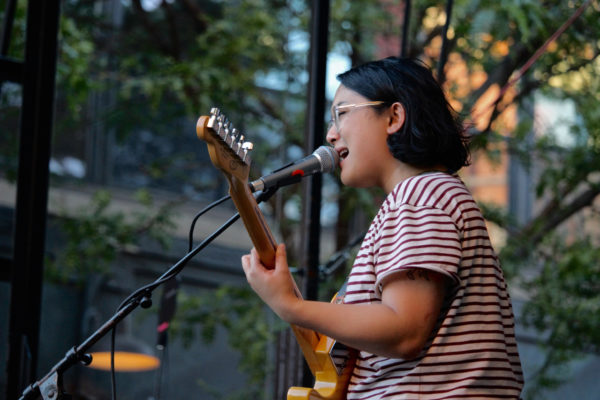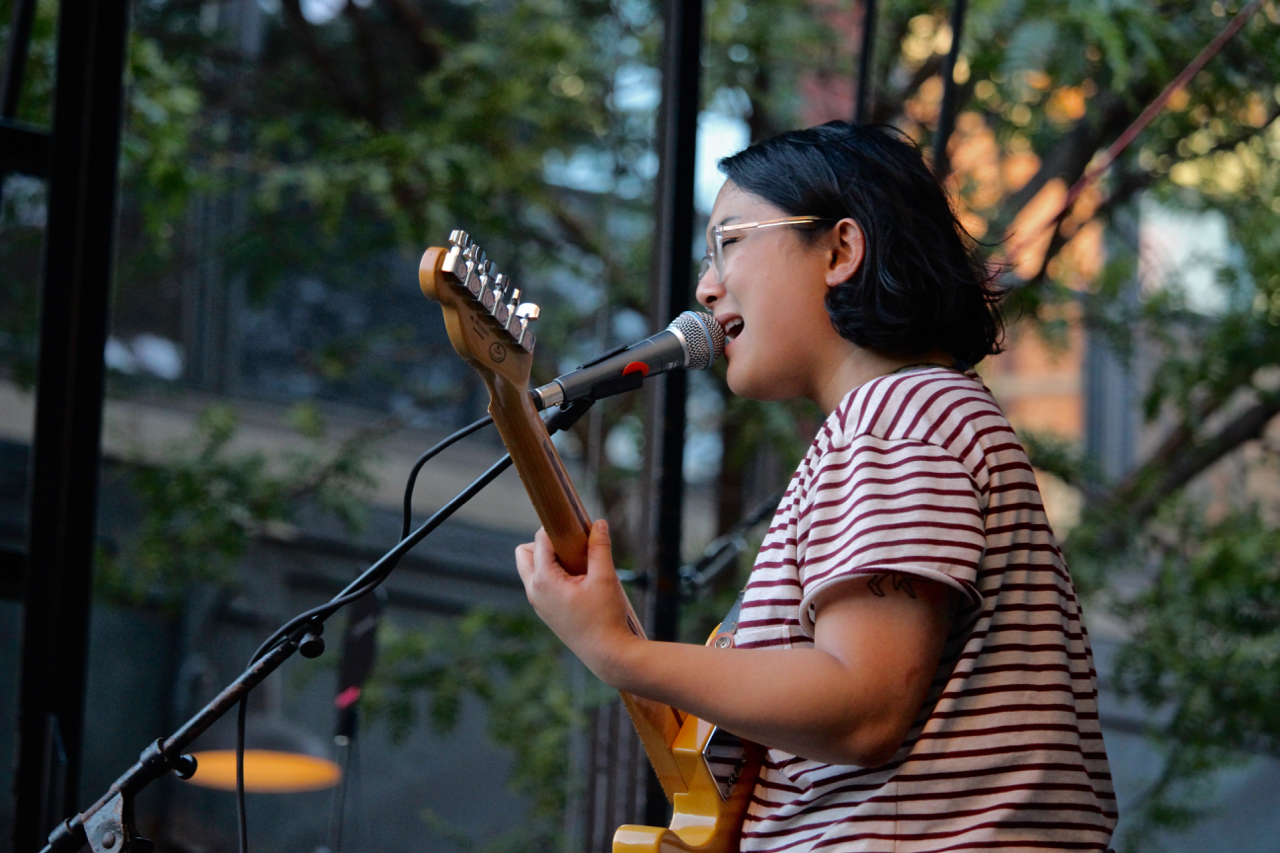
At center stage stands a tall guitarist with long brown hair that falls well past his shoulders. Behind him sits the drummer, with bleached hair peeking through a fitted cap. To his right is the bassist, with shaggy, dirty blond hair and a mustache to match. The trio look like your typical slacker-rock, bedroom-pop outfit, epitomizing hipster musician style and coordinating well with the hip San Francisco crowd. But they’re not exactly the reason everyone is here, gathered in the Great American Music Hall in the Tenderloin district of San Francisco. To their left is songwriter Melina Duterte, who recorded nearly every song the band is about to play alone in her bedroom. More than a head shorter than both her bandmates on stage next to her, with short black hair and clear-frame glasses, Duterte, performing as Jay Som, is equipped with a guitar of her own and appears calm, collected and confident.
The 23-year-old Oakland native has earned the confident poise we see on stage, having opened for Peter Bjorn and John and toured with Mitski and Japanese Breakfast. She uploaded her first album, “Turn Into,” on Bandcamp while tipsy. It was a combination of finished and unfinished works, but the dreamy quality and raw, introspective lyrics struck a chord with listeners and gained Duterte lots of deserved attention. Her latest release, “Everybody Works,” shows off the range of both her masterful talent and her many musical influences. From guitar rock to funk and R&B to ’80s synth-pop à la Carly Rae Jepsen, the array of genres represented on the album make it all the more impressive that Duterte created each one, start to finish, on her own.
This variety of genres made for a dynamic concert experience, with Duterte and her charismatic band members expertly leading the crowd from song to song. Transitions from Duterte’s somber, mature tunes to her more upbeat pop jams did not feel misplaced or jarring. Instead, it felt like a realistic representation of the complexity of life, the band and the audience sharing in both the euphoric and the devastating moments of life as a young adult.
The banter between Duterte and her bandmates kept the mood light and happy, even as we took in the sometimes heartbreaking lyrics. In the middle of some songs, band members would gesture at each other, drawing smiles from the crowd, with Duterte playing an imaginary game of catch with her bassist across the stage mid-song. She also shouted out two band members’ parents who were in the crowd, which was pretty heartwarming. These moments created the impression that while Duterte has created all of these songs on her own, her closeness to and affection for her band was undeniable. She also told of the many times she was in the crowd at this same venue as a teenager growing up in the Bay Area, which made the show feel that much more intimate.
This atmosphere of closeness translated to the crowd, and peaked during Duterte’s performance of “The Bus Song.” The audience chanted the lyrics together as the chorus swelled: “Take time to figure it out/I’ll be the one who sticks around.” The message of support and compassion was sung like sage advice from Duterte to the crowd, but also served as a self-reminder to the audience who sang along to be patient, kind and thoughtful through hard times.
As the show neared its end, Duterte told the crowd that there was one song left, “and then it’s time to go to bed.” Her maturity and confidence throughout the show had me convinced that I need to listen to this wise advice, as I already wished she was my real-life big sister at this point. Once off the stage, a demand for an encore inevitably followed. Despite the mellow and dreamy nature of most of her songs, Duterte has clearly kept the crowd energized and entertained as they loudly and, almost aggressively, called for her return to the stage. She eventually did return, this time wearing a quirky, off-white cowboy hat. At once ready for bed and ready to party, Duterte’s silliness is endearing and fascinating. She gave the crowd one last song to dance to, but closed with her early hit “I Think You’re Alright.” The song sounded beautiful and heartbreaking and told of a one-sided relationship, but found power and redemption as it rose to a gritty, guitar-heavy close.
The complexity of this last song captured the essence of the many sides of Jay Som’s music and stage presence. Duterte’s songwriting encapsulates multiple genres, moods and experiences that resist categorization and one-dimensional readings of both her music and her identity as a young Filipino-American woman. “Everybody Works” is at once an incredibly introspective album and a masterful work that many can relate to. Jay Som’s performance style is welcoming and empathetic, creating a space where listeners can dance their worries away while being inspired to reflect and reminded that they are not alone.
Contact Paulina Campos at pcampos2 ‘at’ stanford.edu.
